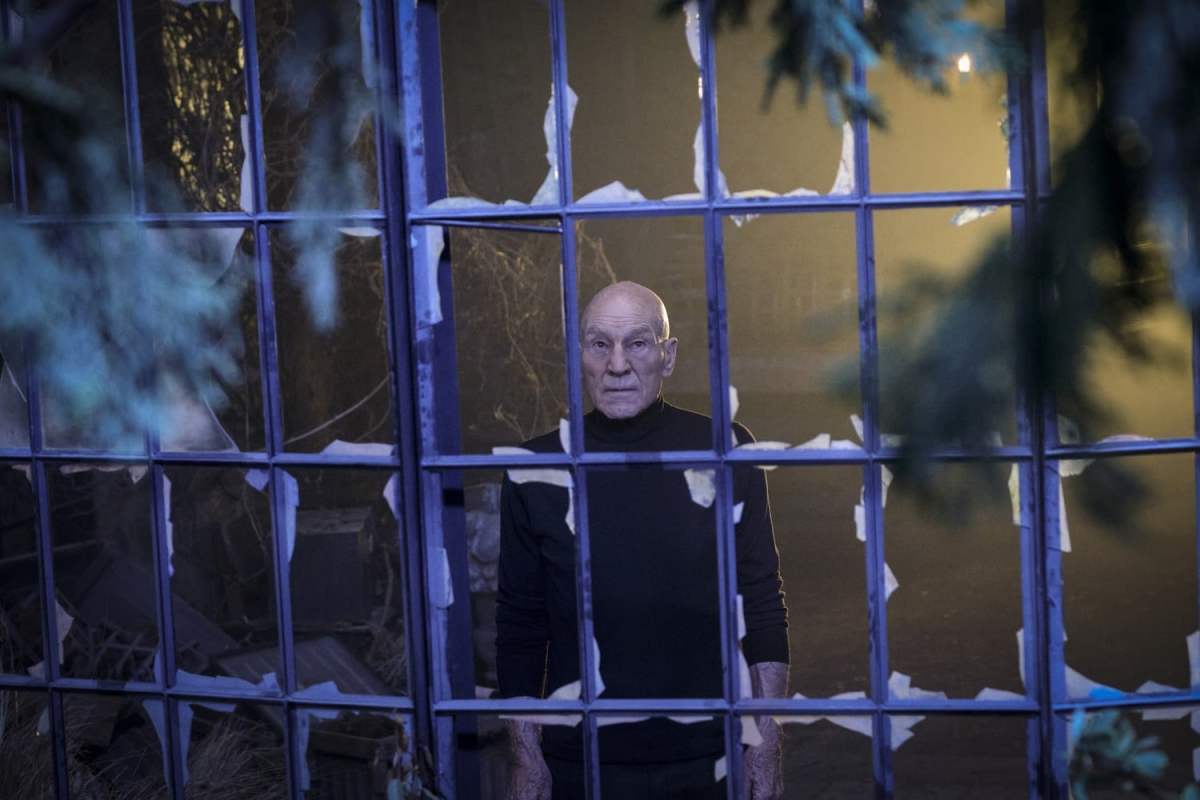This article contains some spoilers for Star Trek: Picard season 2, episode 1, “The Star Gazer.”
Star Trek: Picard season 2 begins with a blast from the past, quite literally.
Crew members in Starfleet uniforms race down familiar-looking corridors. They grab phasers and rifles to combat the Borg intrusion into their ship. They hurry to the bridge, to find Jean-Luc Picard (Patrick Stewart) facing down the Borg Queen (Annie Wersching). With no other options, Picard sets the self-destruct on the vessel. It cannot help but recall Star Trek: First Contact, the best-received of the Star Trek movies starring Stewart, down to the production design and the canted angles.
It’s a surprisingly strong nostalgic play for the series, particularly given that one of Patrick Stewart’s big sticking points when asked to reprise the role of Jean-Luc Picard was that he didn’t want to play a greatest hits mixtape. “I didn’t want to be dipping back into the past to make this work,” Stewart stated in interviews leading into the first season. While the first season did feature the Borg and drew heavily from Star Trek canon, it did so in unpredictable ways.
The first season of Picard drew from unusual places in the lore. It reunited the Borg and the Romulans for the first time since “The Neutral Zone.” It revealed that Riker (Jonathan Frakes) and Troi (Marina Sirtis) had named their daughter Kestra (Lulu Wilson), a reference to the maligned episode “Dark Page.” In terms of plot, the season drew most heavily from the most hated of the movies headlined by Stewart, Star Trek: Nemesis. It was a bold approach.

In contrast, Star Trek: Picard season 2 draws from much safer sources. It isn’t just First Contact. The episode marks the return of fan-favorite characters like Guinan (Whoopi Goldberg) and Q (John de Lancie). Q’s appearance in the closing moments of the episode directly invokes the very first and very last episodes of The Next Generation, “Encounter at Farpoint” and “All Good Things…” The idea of the Borg negotiating through Picard recalls “The Best of Both Worlds.”
More to the point, as with Star Trek: Discovery, the second season of Picard seems to have gone out of its way to scrub off many of the rougher and more interesting edges of the previous season. Another of Stewart’s conditions to return to the role was that he didn’t want to wear a Starfleet uniform again. “I didn’t want to wear a uniform in this, because I felt it very important that we put a lot of distance between Next Generation and what we are seeking to do here in this,” he explained.
Much of the first season of Star Trek: Picard took place outside the safe and familiar confines of Starfleet and the Federation. It suggested the potential for the franchise to grow beyond the limited perspective of earlier iterations, to develop the more multicultural perspective championed by Star Trek: Deep Space Nine. Unfortunately, like the later seasons of Discovery, the second season of Picard seems to suggest the franchise has an inability to see beyond the Federation’s very particular worldview.
In “The Star Gazer,” most of the show’s ensemble have been folded into Starfleet infrastructure. Picard is “Chancellor of the Academy.” Elnor (Evan Evagora) is “the first fully Romulan cadet at Starfleet Academy,” a nice allusion to “The Drumhead.” Raffi Musiker (Michelle Hurd) and Cristobal “Chris” Rios (Santiago Cabrera) are both back in uniform, with Rios commanding the Stargazer. At the Academy, there are nostalgic allusions to older Starfleet vessels, the Excelsior and the Grissom.

In the first season of Picard, the Federation was a somewhat antagonistic force. This was most obvious in a heated (and controversial) exchange in “Maps and Legends,” in which Admiral Kirsten Clancy (Ann Magnuson) calls out Picard for his “sheer fucking hubris.” In contrast, “The Star Gazer” finds Admiral Sally Whitley (April Grace) requesting Picard’s help, even recommissioning him through the symbolic offering of a communicator like deputizing a volunteer via a sheriff’s badge.
This does feel regressive, particularly given the content of Picard’s speech to the graduating class about the appeal of “a future free from the shackles of the past.” Then again, this was the central tension of the first season of Picard, and it makes sense that it carries over. At its core, Star Trek: Picard is a show about coming to terms with the reality that the utopian future The Next Generation promised never came to pass, but it is reluctant to engage in meaningful introspection with that idea.
The Next Generation was a product of the end of the Cold War. It captured what Charles Krauthammer called “the unipolar moment” and what Francis Fukuyama called “the end of history.” It emerged in a moment of economic prosperity and political stability for the United States. It was essentially an extrapolation of American self-image into the distant future, anchored in the belief that the existing global order would not change and that things would only continue improving.
Instead, the audiences that grew up watching The Next Generation got decades of political unrest and turmoil. It makes sense that Star Trek: Picard should be preoccupied with the passage of time, even beyond its octogenarian leading actor. “Today is glorious, and none of our tomorrows are guaranteed,” Laris (Orla Brady) toasts, and it seems like a portentous line.

“The Star Gazer” leans into the nostalgia that the previous season struggled with. Picard is openly reflective. While obviously necessitated by the aging of the actors, there is something clever in how the episode makes a point to have immortal characters like Guinan and Q choose to age in solidarity with Picard, conceding his mortality. “I try to keep up,” Guinan admits. Q taunts, “Let me catch up. There. Now we’re even.” Time is foregrounded as the show’s central theme.
“The true final frontier is time,” Picard tells the young students in his charge, and he concedes that few things haunt him as much as “what could have been.” It’s a weird retrofuturism, the longing for a future that once seemed tangible but has now slipped through the cracks. The theme isn’t just tied to the metatext of the series, but reflected in Picard’s own character arc. In a nice touch, Picard hears the faint strains of Edith Piaf’s “Non, je ne regrette rien” in his final moments, ironic and taunting.
Picard spends a significant amount of time in “The Star Gazer” ruminating on the missed romantic and personal opportunities. He wonders about the life he led and perhaps the life he didn’t. This provides another anchor back to a beloved Next Generation episode, suggesting “Tapestry.” Then again, it is appropriate. It is a shame that the production team was unable or unwilling to convince Gates McFadden to return to develop perhaps Picard’s greatest missed romantic opportunity.
Tying back into this reckoning with the post-Cold War enthusiasm of The Next Generation, “The Star Gazer” marks the return of the Borg as a major threat. The Borg have been read in a number of ways across the history of the Star Trek franchise, both as a dark mirror of the Federation (and therefore the United States) and as “the ultimate communists.” After all, assimilation is the ultimate erosion of individual identity, the swallowing of a single person into a larger anonymous collective.

In the years following the end of the Cold War, Star Trek became preoccupied with the fracturing of the Borg Collective in stories like “Descent,” “Unity,” “Collective,” and even “Unimatrix Zero.” It was easy to read this erosion of the Borg Collective as a metaphor for the collapse of the Soviet Union and the ensuing geopolitical and social chaos. As such, it feels timely to see the Borg return as a significant – and perhaps desperate – threat to galactic stability as Russia causes global chaos.
Of course, “The Star Gazer” was produced long before recent events, but the premise is strikingly relevant. One consequence of the Russian invasion of Ukraine is that it actually reversed a number of trends in international politics. The emergence of the Russian threat has forced Europe and America to work together in a way that would have been difficult to imagine even a year ago. The European Union has overcome disharmony and disorganization to respond in unity to preserve its ideals.
This adds compelling nuance and shading to the second season of Picard, as it continues its ruminations upon the loss of The Next Generation’s utopianism. Some traditionalist Star Trek fans who grew up with The Next Generation still struggle with the darker tone of more recent iterations of the franchise. In truth, they are perhaps closer in spirit to the tone of the original Star Trek, with its recurring preoccupation with insanity and collapse mirroring the chaos of the 1960s. It is no longer the 1990s. These are turbulent times, after all.
Star Trek: Picard season 2 is off to an interesting start. As with the first season, there is something intriguing in watching the Star Trek franchise grapple with the legacy of The Next Generation. However, there’s also a sense of compromise and reluctance to meaningfully grapple with failures of that generation. Ironically, Picard remains reluctant to surrender the floor to the next generation. Still, there is potential here. Maybe it’s worth seeing what’s out here.






Published: Mar 3, 2022 01:00 pm